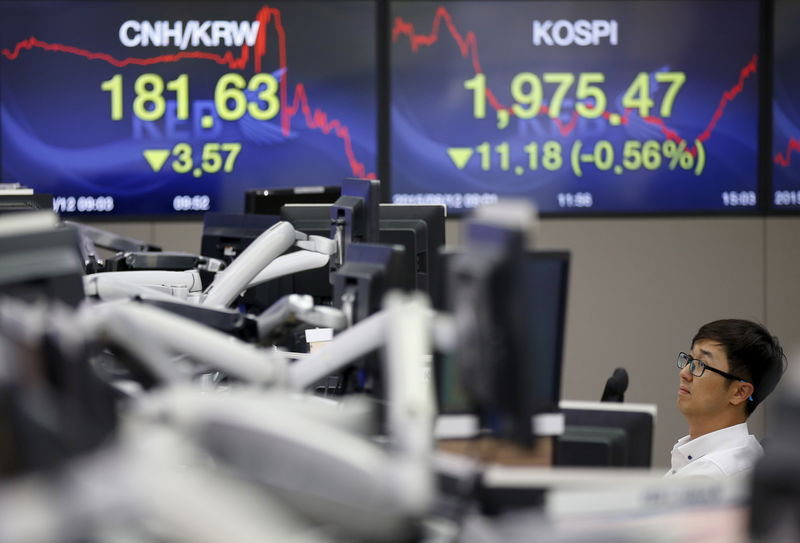Asian stocks battered by technology rout, weak economic data
2023.04.24 23:56

© Reuters
Investing.com– Most Asian stocks fell further on Tuesday, with South Korea’s KOSPI plummeting on a soft GDP reading, while losses in U.S. technology stocks spilled over into regional markets amid concerns over a slowdown in earnings.
The was among the worst performing Asian bourses for the day, down 1.6% as data showed that the South Korean economy in the first quarter of 2023.
While steady consumer spending helped fish GDP out of negative territory, capital investment and manufacturing activity in the country continued to weaken, heralding more economic headwinds.
Other technology-heavy bourses logged steep losses for the day, with Hong Kong’s index down 1.7%, while the index lost 1.2%, tracking overnight losses in Wall Street, particularly the .
Investors sold some of the largest U.S. technology stocks on Monday amid growing anxiety over their earnings, which are due this week. Microsoft Corporation (NASDAQ:), Amazon.com Inc (NASDAQ:), Alphabet Inc (NASDAQ:) and Meta Platforms Inc (NASDAQ:) are all set to report first-quarter earnings later this week.
While shares of U.S. tech majors have risen sharply so far this year, traders fear that the rally may be at its end, especially as earnings begin to reflect the increasing impact of high interest rates and tightening economic conditions.
This weakness spilled over into Asian bourses, given that most regional technology stocks either depend on, or closely track major U.S. technology firms.
Companies with secondary U.S. listings also logged steep losses for the day, with Hong Kong’s Alibaba Group Holdings Ltd (NYSE:) (HK:) and Baidu Inc (HK:) (NASDAQ:) down between 3% and 4%.
This largely dented sentiment towards broader Asian markets, with China’s and indexes down 0.8% and 0.6%, respectively.
Regional markets were also hit by growing caution over a slew of upcoming central bank meetings, most notably the Federal Reserve, which is further next week.
Uncertainty over the Fed weighed on Asian markets in recent weeks, given that higher U.S. interest rates dent the appeal of risk-driven assets.
Japan’s index was among the few outliers for the day, rising 0.3% as new Bank of Japan Governor Kazuo Ueda reiterated that the bank will maintain its ultra-dovish policy in the near-term.
Ueda’s comments come before a on Friday, where the bank is expected to maintain its yield curve control policies as it struggles to shore up local economic growth.








